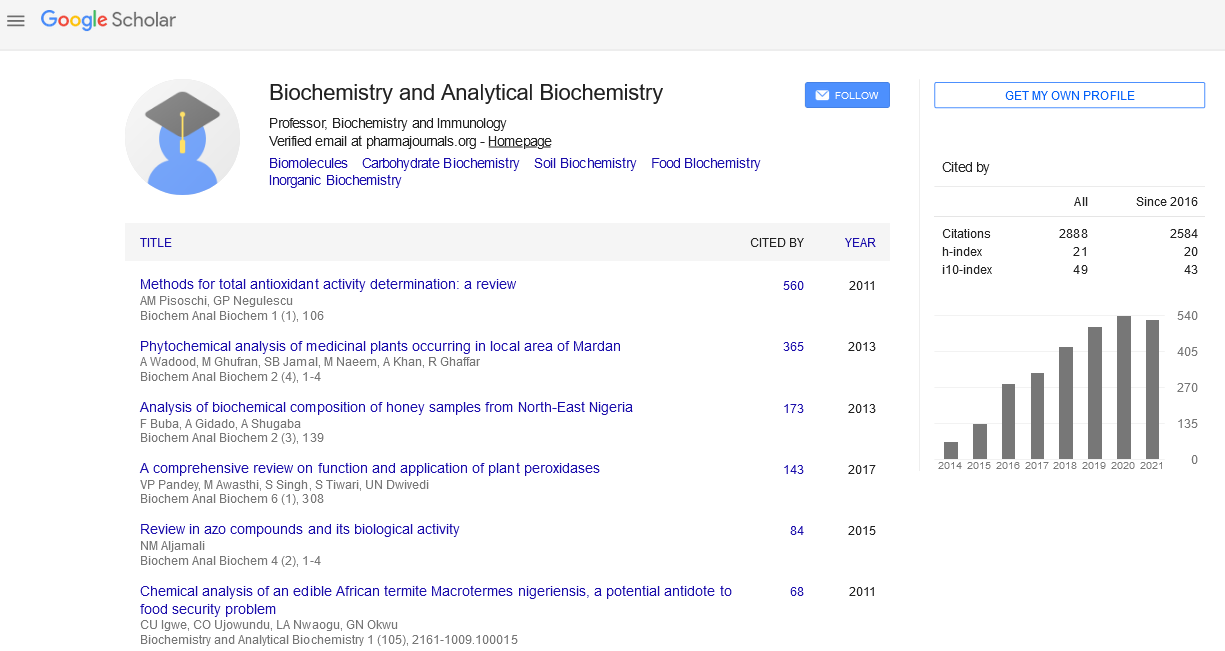Indexed In
- Open J Gate
- Genamics JournalSeek
- ResearchBible
- RefSeek
- Directory of Research Journal Indexing (DRJI)
- Hamdard University
- EBSCO A-Z
- OCLC- WorldCat
- Scholarsteer
- Publons
- MIAR
- Euro Pub
- Google Scholar
Useful Links
Share This Page
Journal Flyer

Open Access Journals
- Agri and Aquaculture
- Biochemistry
- Bioinformatics & Systems Biology
- Business & Management
- Chemistry
- Clinical Sciences
- Engineering
- Food & Nutrition
- General Science
- Genetics & Molecular Biology
- Immunology & Microbiology
- Medical Sciences
- Neuroscience & Psychology
- Nursing & Health Care
- Pharmaceutical Sciences
Abstract
Modulation of Doxorubicin Actions in Hepatocellular Carcinoma Cells by Insulin-Like Growth Factor-I
Maria Grazia Refolo, Rosalba D’Alessandro, Catia Lippolis, Nicola Carella, Caterina Messa, Aldo Cavallini and Brian Irving Carr
Hepatocellular carcinoma (HCC) is typically advanced at presentation and doxorubicin is the chemotherapeutic agent most frequently used in chemoembolization. Tumor microenvironment contains many cell types, including platelets, as well as cytokines and growth factors, potentially capable of modulating doxorubicin actions. Insulin-like growth factor I (IGF1) and its receptor (IGF1-R) signaling is important in cellular proliferation and prevention of apoptosis and the acquisition of chemotherapy resistance. IGF1 is present in platelets, which have been shown to alter doxorubicin actions in HCC cells. The effects on growth and motility after IGF1 pre-treatment in doxorubicin-treated HCC cells were thus examined, as well as the IGF1-R downstream pathways, PI3/Akt and MAPK kinases. We found that IGF1 antagonized the doxorubicin-mediated decrease in cell growth and motility, as well as the doxorubicin-mediated decrease in levels of the proliferation-associated proteins phospho-IGF1-R, phospho-ERK, phospho-p38 and phospho-STAT3. The simultaneous induction of PI3K/Akt pathway, mediated by IGF1 receptor, regulated an increase in levels of Bcl-2, BclxL and survivin through the Akt activation. Furthermore, PI3K/Akt signaling modulated several downstream targets, including phosphorylation levels of 4EB-P1, p70S6K and GSK-3β. Up-regulated IGF1 signaling antagonized the doxorubicin-mediated changes cell proliferation, motility and apoptosis, thus contributing to drug resistance. Therefore IGF1-R may be a promising target for HCC management.


